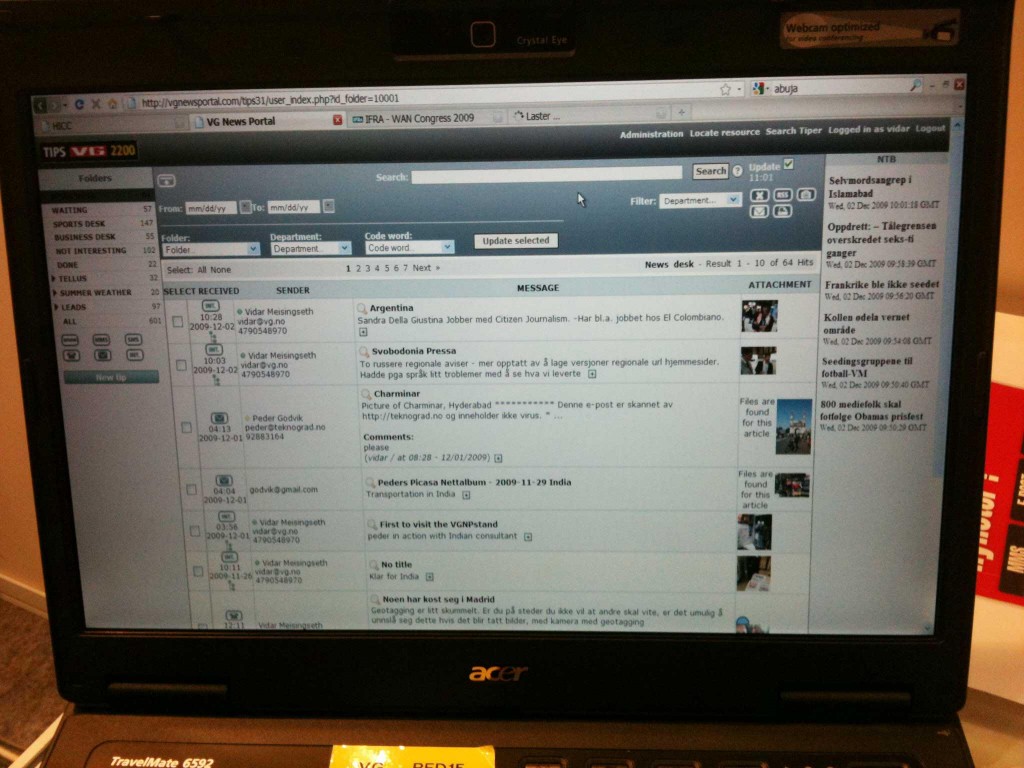Jessica Weiss’ piece about ‘Investigative 2.0’ on the International Journalists’ Network, flags up that there are now more than 50 non-profit investigative journalism organisations around the world:
“The first three nonprofits dedicated to investigative journalism were all American: the Fund for Investigative Journalism (1969), Investigative Reporters and Editors (1975), and the Center for Investigative Reporting (1977).
“Now, there are more than 50 worldwide, and more than half of those are since 2000. Global networks such as ICIJ – made up of 100 journalists in 50 countries, and currently looking to expand – are providing the platform for reporters to connect for cross-border investigations. Local and regional centers, such as Arab Reporters for Investigative Journalism; the Romanian Centre for Investigative Journalism, and the Forum for African Investigative Reporters (FAIR), connect journalists for reporting, networking, conferences, trainings and more. FAIR is sponsoring Africa’s first big investigative reporting conference later this month in Johannesburg.”
You can find a list of excellent resources on the International Consortium of Investigative Journalists page at this link.
Using the Center for International Media report on strategies for support for investigative journalism, with the first survey of nonprofit journalism centers worldwide, the consortium (led by the Center for Public Integrity) has produced a list of over 35 around the world:
Africa
Forum for African Investigative Reporters
Ghana Center for Public Integrity & Focal Media
Asia
Nepal Center for Investigative Reporting
Philippine Center for Investigative Journalism
Eastern Europe
Balkan Investigative Regional Reporting Network
Bosnia Center for Investigative Reporting
BTC ProMedia Foundation, Bulgaria
Bulgarian Investigative Journalism Center
Investigative Journalists of Armenia
Media Focus — Center for Investigative Reporting, Serbia
Romanian Centre for Investigative Journalism
Former Soviet Union
Caucus Media Investigative Center, Azerbaijan
Investigative Journalism Center of Moldova
Latin America
ABRAJI — Brazilian Association of Investigative Journalism
Center for Journalism and Public Ethics, Mexico
Chilean Center for Investigative Journalism and Information
Consejo de Redacción, Colombia
Instituto Prensa y Sociedad (IPYS), Peru
Middle East
Arab Reporters for Investigative Journalism, Jordan
United States
Center for Investigative Reporting, San Francisco
Center for Public Integrity, Washington, D.C.
Fund for Investigative Journalism, Washington, D.C.
Investigative Reporters and Editors
ProPublica, New York
Schuster Institute for Investigative Journalism, Brandeis University
Stabile Center for Investigative Journalism, Columbia University
Western Europe
Centre for Investigative Journalism, London
Danish Association of Investigative Journalism
European Journalism Centre, Netherlands
Finnish Association for Investigative Journalism
Foreningen Gravande Journalister, Sweden
Investigative Reporters Network Europe
Norwegian Foundation for Investigative Journalism
Pascal Decroos Fund for Investigative Journalism, Belgium
SCOOP, Denmark
Swiss Investigation Network
Dutch-Flemish Association for Investigative Journalism (VVOJ)

 And if she’s looking for more contributors, Journalism.co.uk would highly recommend
And if she’s looking for more contributors, Journalism.co.uk would highly recommend